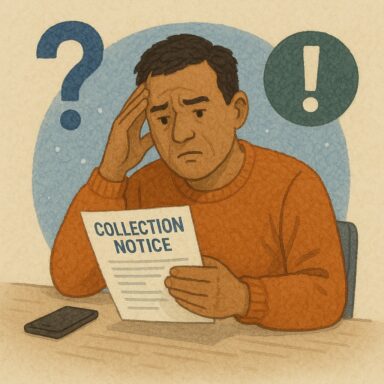Collection Notice Received: How to Proceed

A collection letter lands in your inbox or a call from an unknown number interrupts your day—it’s a moment that can stir unease. At Money Fit, a nonprofit credit counseling organization, we
often hear, “What do I do now?” from individuals facing this scenario. The answer: You have options and more control than you might realize. Whether it’s a legitimate debt, an error, or a potential scam, this article outlines actionable steps to respond with confidence. Need immediate guidance? Certified counselors are available at no cost—reach out today.
Initial Steps: Assess the Situation
A collection notice signals a debt—often from credit cards, medical bills, or utilities—passed to an agency after nonpayment. Before acting, pause and evaluate two key questions:
- Do I owe this debt?
- Can I afford to pay it?
Your response hinges on these answers. The Fair Debt Collection Practices Act (FDCPA) ensures your rights, so proceed methodically.
If You’re Unsure About the Debt
Uncertainty about the debt’s validity is common—here’s how to clarify it.
- Avoid Immediate Payment: Never pay over the phone or with gift cards on first contact—scammers thrive on urgency and odd payment methods.
- Verify with the Creditor: Contact the original creditor (e.g., hospital, credit card issuer) directly. Ask: Is this debt mine? Is it accurate? Was it paid or insured? Medical bills often split across multiple providers, so check each source.
- Seek Details: Ask the collector: Who are you? What’s the debt for? What’s the original amount and date? Request this in writing. If they evade, it’s a red flag—proceed with caution.
If the Debt Is Legitimate
Confirmed it’s yours? Move to resolution.
- Pay the Creditor Directly: Reach out to the original creditor to settle in full—use their portal or mail a check, requesting a receipt. This may keep it off your credit report and opens negotiation for payment plans.
- Pay the Agency: If the creditor defers to the collector, pay them the full amount. Agencies often buy debts at 30-40% of value, so your payment exceeds their cost—consider negotiating terms (more below).
- Act Promptly: Delays can add fees or escalate collection efforts—resolve it efficiently.
If It’s a Scam
Suspect fraud? Protect yourself.
- Disengage: Don’t respond further—block the number and ignore calls. Engaging fuels scammers.
- Report It: Notify:
- Your state’s consumer protection agency (e.g., Department of Financial Institutions).
- Your state Attorney General’s office.
- The Better Business Bureau (BBB).
- Stay Alert: Scammers may use real debt data to deceive—never share personal details like your Social Security number.
If the Debt Isn’t Yours or Is Wrong
Errors happen—challenge them.
- Dispute with Bureaus: Visit AnnualCreditReport.com for your free report. If the debt’s listed, dispute it online at Equifax, Experian, and TransUnion with evidence (e.g., payment proof). Learn more about how you could proceed with a disupute.
- Contact the Creditor: Inform the original creditor of the mistake—request they correct or recall it from collections.
- Notify the Collector: Write to the agency: “This debt is inaccurate—remove it.” Include documentation. If it persists, a CFPB complaint at consumerfinance.gov can enforce action.
Why Collections Happen
Collections touch most Americans at some point—medical debt tops the list, driven by fragmented billing. One hospital visit might yield bills from labs, radiologists, and equipment providers—easy to overlook. Credit card overdue balances, student loans, and old utility bills also feed the cycle. Agencies buy these debts cheap, aiming to collect the full amount, which explains their persistence. Understanding this helps you separate fact from fiction.
Payment Options for Valid Debts
If it’s yours, decide how to pay.
- Creditor Benefits: Paying the creditor directly often avoids credit damage and allows flexible terms—monthly plans are more likely here.
- Agency Negotiation: Collectors profit on the spread (paying 30-40% of the debt’s value). Offer less than full—say, 50%—and request “paid in full” status in writing. For payments, propose terms (e.g., “$100 monthly for 10 months”) and document it—though acceptance varies.
- Avoid Ignoring It: Unresolved debts risk calls, lawsuits, wage garnishment, or credit hits—inaction rarely pays off.
Nonprofit Support Available
Struggling to pay or unsure where to turn? Money Fit’s nonprofit credit counseling can lighten the load. Certified counselors negotiate with creditors, consolidate debts into one payment, and often halt interest or fees—free consultations make it accessible.
Request Your Free Consultation
Your Next Move
A collection notice isn’t a dead end—it’s a prompt to act. Verify its legitimacy, pay what’s owed, dispute errors, or report fraud—your path depends on what you uncover. Most face this at some point, but you’re equipped to respond. Money Fit’s nonprofit expertise is here—contact us for a free consultation and turn uncertainty into progress.
Frequently Asked Questions About Collection Notices
Should I pay a collector right away?
No—verify the debt first. Paying without confirmation risks fraud or losing dispute rights. Contact the creditor to confirm legitimacy.
What if the debt isn’t mine?
Dispute it with the collector, credit bureaus, and original creditor. Provide evidence—errors must be corrected or removed.
Can I negotiate with a collection agency?
Yes—they often buy debts at 30-40% of value. Offer less than full, get terms in writing, and request ‘paid in full’ status.



